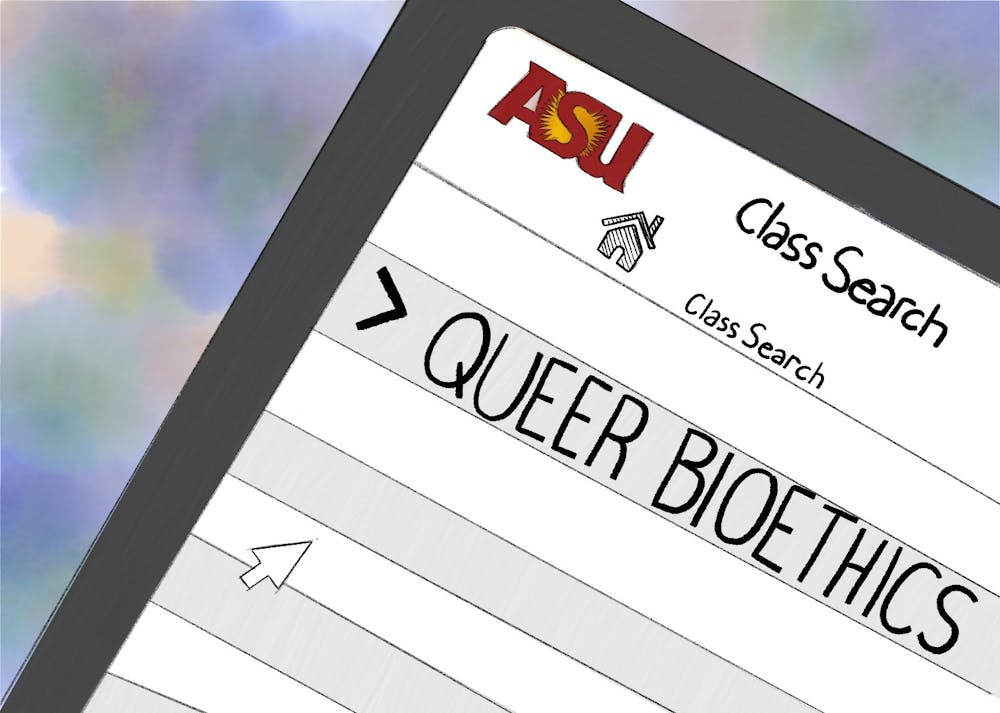A class offered occasionally within Barrett, The Honors College, teaches LGBTQ+ issues are critical for providing additional perspectives that deepen students' understanding of how to help others.
Bioethics is the study of internal practices in medical and biological fields to ensure practices are done responsibly and equitably. Since 2016, Barrett has offered a queer bioethics class to narrow the scope of bioethics to the lives of queer people.
Michelle Saint is one of the professors who has previously taught BIO 312, the bioethics class, offered by The College of Liberal Arts and Sciences.
"It's a way of focusing on the connection between how we attempt to live good lives, and the forms of technology that can help or get in our way of that," Saint said.
Jennifer Brian, the creator and current professor of the queer bioethics class, seeks to narrow bioethics to serving a specific community.
"Queer bioethics draws our attention in a more focused way to the ways in which lesbian, gay, bisexual, transgender, queer, intersex people are uniquely impacted by healthcare practice and policy," Brian said.
During one week of her class, Brian assigned an article titled, "My New Vagina Won't Make Me Happy," by Andrea Long Chu. In the article, Chu, a transgender woman, is vulnerable about her desire for gender affirming surgery, even though she is aware it will not cure her depression or gender dysphoria.
According to Brian, the general questions the article explores is about autonomy and treatment.
"Are we gatekeeping? Are we doing what's right for patients? Or are we preventing them from truly realizing their bodily autonomy?" she said.
Brian recognizes that diversity within the LGBTQ+ community can lead to better care, because it leads to a deeper understanding of what it means to live a fulfilling life.
"Trans people are not a monolith," Brian said. "When we say transition looks like top surgery, it looks like bottom surgery, it looks like facial feminization surgery, it looks like vocal cord stripping, then we're reducing the opportunities for people to express themselves how they want."
The larger question of who deserves care and resources in society is a separate field, called biopolitics, and could not be fully covered in one course. Brian said she still focuses on the intersection of class, race, disability and queer theory to provide familiarity with cases and situations people may not be familiar with.
"I think just by way of being a provider in a country without universal health care, you are a political agent. …I think to not be at least politically literate is irresponsible for a provider," said Hannah Grabowski, co-teacher of the queer bioethics class and a gender studies PhD candidate.
Part of the value of queer bioethics is that it introduces and familiarizes future health care providers with LGBTQ+ topics so they can better address patient needs. Grabowski recommended courses through the School of Social Transformation for students who want to familiarize themselves with queer theory.
Learning more about patient care extends beyond the classroom. Ruby Maderafont, a museum studies student and facilitator of advocacy for the Rainbow Coalition, said there are educational resources available through the organization.
The club exists to provide resources to help queer students succeed at ASU, but also to help others expand their knowledge.
"Allies are also included in the mix when we are providing information," Maderafont said.
Edited by Annie Graziano, Angelina Steel, Sophia Balasubramanian, Piper Hansen and Anusha Natarajan.
Reach the reporter at syramir2@asu.edu and follow @nerdyoso on Twitter.
Like The State Press on Facebook and follow @statepress on Twitter.
Sophia is a senior studying biological sciences. This is her fifth semester with The State Press. She has also worked as a science and technology reporter.




